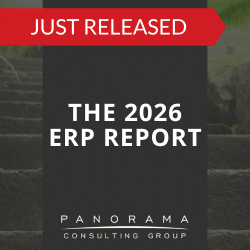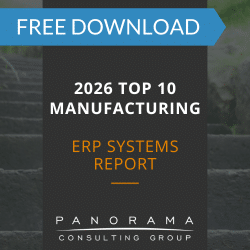- A big bang ERP implementation is a strategy where all modules and offices transition to the new ERP system simultaneously.
- A phased ERP implementation is an approach involving multiple go-live dates for different modules, business units, or locations.
- A risk of big bang implementations is post-go-live issues due to lack of gradual testing.
- The financial implications of phased rollouts can be higher operational costs due to maintaining legacy and new systems concurrently.
- A hybrid implementation approach combines big bang and phased strategies, applying each where most suitable.
You have many decisions to make during an ERP implementation. One of the most important decisions is what type of ERP implementation you want to pursue.
Do you want to do a gradual rollout? Do you want to go live with everything at once in a “big bang” implementation?
Today, we’re discussing big bang vs phased implementations, so you can weigh the pros and cons and decide which route is best for your company.
The 2026 Top 10 ERP Systems Report
What vendors are you considering for your ERP implementation? This list is a helpful starting point.
What is a Big Bang Implementation?
The term “big bang ERP implementation” is used to describe a go-live scenario where you migrate to the new system at a single point in time. This means all the company’s modules and offices go live simultaneously.
Big bang ERP implementations usually work best for organizations that only have one or two functional areas that will be using the new software.
Risks of Big Bang Rollouts
One of the main cons of a big bang approach in ERP is that you miss the opportunity to gradually resolve bugs and compatibility issues. As a result, you might discover a major issue when you’re already live.
Our ERP consultants always tell clients to develop a contingency plan to ensure they can recover their data in the event of a system crash. This plan should include several key components:
- Comprehensive System Backups: Regular backups ensure that critical data can be restored promptly.
- Failover Mechanisms: Consider temporary failover systems to maintain operations if the primary ERP system fails.
- Scenario Planning: Identify potential failure scenarios and develop specific recovery protocols for each.
- Crisis Communication Plan: Ensure all stakeholders are informed about roles, responsibilities, and communication channels during a system outage.
Despite the risks, the big bang approach in ERP does have plenty of benefits. Chiefly, companies that successfully manage a big bang implementation may enjoy a quicker and lower-cost rollout than companies that spread out the implementation process over a longer period of time.
What is a Phased ERP Implementation?
With a phased implementation approach, you establish several small go-live dates for each phase of your project, rather than a single date that affects your entire enterprise.
You can set milestones based on variables, such as:
- Module
- Business unit
- Geographic location
For instance, a manufacturing company might go live in their accounting department in March, and go live with inventory and warehousing operations in April. This phased ERP implementation approach would allow the company to identify and fix smaller system issues, like data integration errors and inventory tracking discrepancies.
Financial Implications of Phased Rollouts
- System Maintenance: Ongoing support and updates for both systems.
- Employee Training: Additional training sessions to manage dual systems.
- Integration Tools: Investment in tools to bridge old and new systems temporarily.
However, these expenses can be offset by the benefit of higher user adoption. One of the greatest benefits of a phased rollout is that it gives employees more time to adapt to the new ERP software.
For instance, if you’re phasing by module, you can stagger end-user training so employees have more time to learn specific aspects of the system, like report generation or workflow configuration.
Bridging Old and New ERP Systems
If you’re considering a phased ERP implementation approach, you’ll likely need to keep your old and new systems temporarily bridged as you migrate data. This ensures employees have all the data they need to do their job.
One way to establish a bridge is to use specialized interfaces to create the connection and put standard operating procedures (SOPs) in place to define how business processes will operate during the interim.
The Hybrid Approach
If your project team is at an impasse, you could consider combining both approaches, rather than seeing the choice as an “either-or” scenario.
One popular method is to use a big bang implementation for smaller business units and transition into a phased implementation for larger business units.While the hybrid method offers flexibility, it also introduces complexity in the following areas:
- Resource Allocation: Teams may struggle to support both strategies simultaneously, stretching resources thin.
- Change Management: Navigating dual implementation strategies requires precise communication and training plans to avoid confusion.
- Data Consistency: Ensuring data integrity across systems can be challenging without robust integration tools.
Choosing the Right ERP Implementation Method
If you’re trying to decide between a big bang ERP implementation and a phased implementation approach, it helps to understand your unique business needs. What works for one company might not work for others.
If you have multiple sites or business units, a phased ERP implementation is usually the most practical. However, if you’re at the helm of a smaller organization and are willing to assume the risk of a big bang approach in ERP, you may be able to enjoy a faster and more cost-effective project.
Looking for a trusted partner as you make this decision? Our ERP implementation consultants can help you determine an implementation strategy that aligns with your ERP project goals. Request a free consultation below to learn more.













